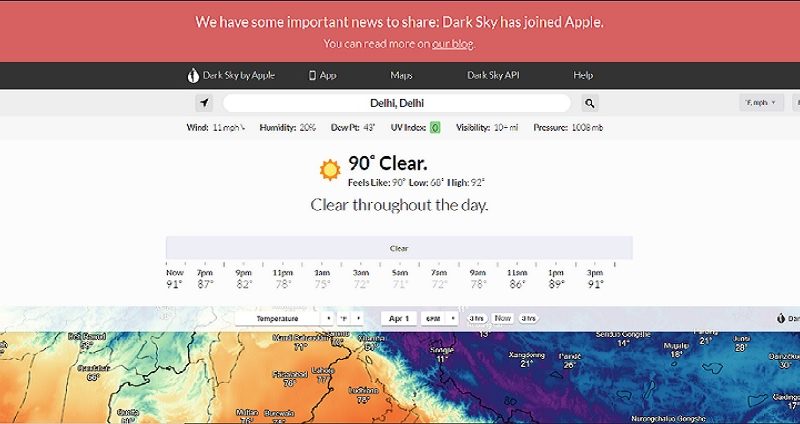Apple has acquired weather app Dark Sky, famous for its accurate hyper-local weather predictions that are accurate to the latest minute based on the user’s location. The announcement was made via a blog post on Dark Sky’s website.
“Our goal has always been to provide the world with the best weather information possible, to help as many people as we can stay dry and safe, and to do so in a way that respects your privacy,” Dark Sky co-founder Adam Grossman said via the blog on Tuesday.
“There is no better place to accomplish these goals than at Apple. We’re thrilled to have the opportunity to reach far more people, with far more impact, than we ever could alone,” he added.
But, as has often been the case in the past, Apple has played another petty hand to stifle competition. The acquisition announcement was followed by the decision to revoke support for android based mobile phones and wearable. Dark Sky announced that the app will no longer be available for download via the Google Play Store, although service to existing users and subscribers will continue until July 1, 2020, after which the app will be shut down. Subscribers who are still active at that time will receive a refund. On the other hand, no changes have been planned for iOS users yet.
The forecasts and embeds on the website will also follow the same schedule, being available until July 1st, 2020, after which only API customers and iOS users will be able to access it.
Another change announced will be to the API program. Dark Sky will no longer accept new API requests, while the existing ones will continue until the end of 2021. Nothing further has been specified.
Founded in 2011, Dark Sky rose to prominence owing to its accurate hyper-local predictions, as well as minute-to-minute weather details, based on the user location. By 2015, the company claimed to be serving 8 Million forecasts a day. The current downloads also stand at over a Million for the app.
The latest move will cast further shadows over Apple’s approach to competition. The tech giant has been accused of holding a tight-noose over the developers while anti-trust agencies have questioned its app store policies. Apple, in its defense, has claimed the restrictions allow it to maintain a standard of security.
The Tech Portal is published by Blue Box Media Private Limited. Our investors have no influence over our reporting. Read our full Ownership and Funding Disclosure →






